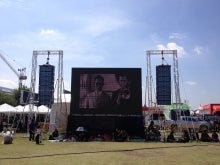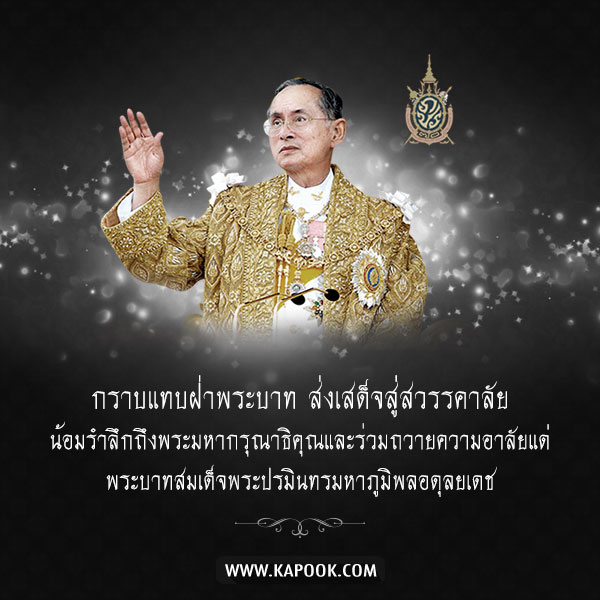The Thai King Passes, the Music Stops

In October 2016, I went to Thailand to gather sounds through field recording in order to compose a soundscape with sound artist Samuel Gouttenoire. This project was part of Le Festival de l’Imaginaire (Paris), organized by La Maison des Cultures du Monde. The soundscape would be played as an ambiance for the audience to immerse itself into Thailand’s sonic universes prior to the performance of Dao Phra Suk Sin, a Thai band from Phetchabun. Pierre Prouteau, the main organizer of this project was the person who I joined in Thailand and with who I conducted field recording.

Field recording in the jungle of Khao Yay Park
I arrived in Bangkok in the morning of October 13th. After we got to the hostel, a little house along the Chao Phraya River, I unpacked and we got something to eat. We then decided to take it slow as I had just got off a 22 hours flight. Around 7pm, we went for a walk in the neighborhood. As we were strolling through the streets, we were shocked by the quiet and the woebegone attitudes of Thai people; a lot of them were weeping. The radios and TVs’ resonances would quickly let Prouteau (the only one of us speaking Thai) understand that the Thai King, Bhumibol Adulyadej had just passed. He was the world longest ruling King; he had been in power for over 70 years. As Prouteau was telling me more about the King, I understood that he was very important for the nation as well as very loved and respected by Thai people. This historical moment for the country also signified that it was entering a mourning state that would highly disrupt its usual rhythm and functioning, including its music. It also forced us to reconsider some of our plans. A sound system competition (an event where sound systems meet and challenge each other sonically and in terms of volume) that we were supposed to go to in Buriram, a city in the East, was cancelled. We decided to stay a couple days in Bangkok so that we could evaluate the extent of the country’s disruption.

The belated King Bhumibol Adulyadej
On October 14th, millions of Thais gathered together on the route of the funeral cortege, which transported the belated King from the hospital where he passed to Wat Phra Kaew (Temple of the Emerald Buddha), the most sacred temple in Thailand. As we joined the crowd of Thais on their last homage to their King, we waited 5 hours, sat on plastic sheets placed on the ground, under a blazing sun. When the cortege passed, a profound silence inundated the crowd, who bowed down joining hands in sign of respect.


Bangkok streets after the funeral cortege
As I heard on television and in discussion with many people, “the children had lost their father,” the King was a unifying symbol for Thai people and the nation as a whole. The government ordained a set of rules to mark the national mourning. Thai civil servants would have to wear black and white colors for a year; the rest of Thais would only have to wear those colors for thirty days, in both cases as a manifestation of their grief. For thirty days, all medias—TV, press and radio—would only broadcast and publish information related to the King’s life, his greatness, the accomplishments of his reign in regards to the nation, and sacred ceremonies and processions in his honor. Manifestations of joy and entertaining activities would also be suspended for 30 days. Most of musical activities, such as the sound system competition, were affected by the mourning and cancelled at the last minute. It has been particularly rough for Thailand because October generally marks the ends of the rainy season and of the Phansaa, a three-months annual retreat observed by Buddhist monks, which is followed by a month of festivities involving a profusion of music in joyous circumstances. Some of these festivities, which normally take place in monasteries are called Kathinas. They are events where lay people make offerings to the monks. Pierre Prouteau, a PhD ethnomusicology student interested in Kathinas and their relation to music and sound, was able to tell me a lot about how long-prepared and awaited these festivities were. The national mourning of the King’s demise caused those festivities, among many others, to be largely cancelled. If no Thai people would talk about it openly with us, because the simple fact of talking about it would be viewed as a sort of disrespect to the King’s honor, we can only imagine how difficult the situation was for organizers and musicians who had been planning these events for months, simply in economical terms. But this was the right thing to do. As many phrased it, these 30 days were literally “given to the King” and paying homage to him was more important than anything.
If the reason of my visit was to record sounds, I was also very eager to discover and experience Thailand musical universes. The situation in the country made my encounters with music rare, but also very intense and attentive. Although, as an ethnomusicologist, I was obviously disappointed not to be able to more extensively explore Thai music, the absence or quasi-absence of music didn’t take my ethnomusicological interests and questionings away. In other words, the absence of music is ethnomusicologically relevant. As I am not a Thailand specialist, what follows should be read as personal questionings and interpretations.
What made it wrong to listen to music while mourning the King? Some music, or at least what I perceived as music, was played on TV or in public gatherings. It raises the question of the different cultural categories at work in the understanding of organized sound. It happened that a lot of those songs were actually psalmodies sung by monks in the name of the King. The psalmodies were not considered offensive music or music at all because of their religious dimension and they were also sung in the name of the King, which made them appropriate according to the grieving situation. It appeared that ceremonial music was more common than popular music. Then, could it be thought that popular music was less noble of the King?
At one public gathering in the royal garden next to Phra Kaew Temple, I was surprised to hear jazz music being played very loud. This apparent contradiction can be understood by the fact that the Thai King was a keen trumpet player who had recorded and composed multiple albums. The music playing was actually his compositions. My hypothesis to understand this is that listening to the King’s music was a way to celebrate him.

Loudspeakers broadcasting the King’s music and picture of the King playing on the screen
But it seems like I have put the question the wrong way. What was forbidden wasn’t music itself, either popular or ceremonial, but joy manifestations and entertaining activities. Nothing was actually said about the music by the government. It just happens that music is often engaged in joyous situations, and as it didn’t correspond to the national mourning state, so it responded by becoming scarce. The same can be said about Kathinas. Those festivities were not forbidden; we actually witnessed a couple of Kathinas in different places. Nevertheless, because they usually occur among an abundance of music and joy, as the two are being linked to each other, they became rare.
Although Thais wouldn’t play joyful music in public spaces, I have run into numerous situations where they would in the intimacy of their homes or private spaces in general. Of course they wouldn’t blast it; they always kept it very low. Not only because they were mourning, but also because it would be highly inappropriate. It would signify that they were not honoring the King, and consequently the nation as well. These remarks not only raise the question of ethical and normative behaviors, but the cultural spaces where they practically operate.
The last point I’d like to raise relies on my ongoing discussions with Pierre Prouteau, who stayed in Thailand as it is his main fieldwork of research. Through our e-mail conversations he was telling me that by the time I left, so roughly two weeks after the King’s passing, a whole new repertoire of music and songs had sprung up. “By listening to the radio, by reading newspapers, I realized that a lot of musicians in Thailand had wrote songs and new stars were born on YouTube, new hits took over the radio waves. The common trait to all these songs is that they all talk about the King, and express Thais sadness.”
One example of these new hits. The title can be translated by “The sky is crying.”
It seems obvious that this song, which was largely broadcast, can be understood as popular music. On that note, I’ll leave the last words to Prouteau: “It is not popular music itself that was forbidden. If the music we’ve heard on TV was played it is because it integrated with the mourning state.”
Samuel Lamontagne is an ethnomusicology Ph.D. student at UCLA. His researches focus on Los Angeles' electronic music scenes, and on audio-technology in its relation to musicians' creative processes.





